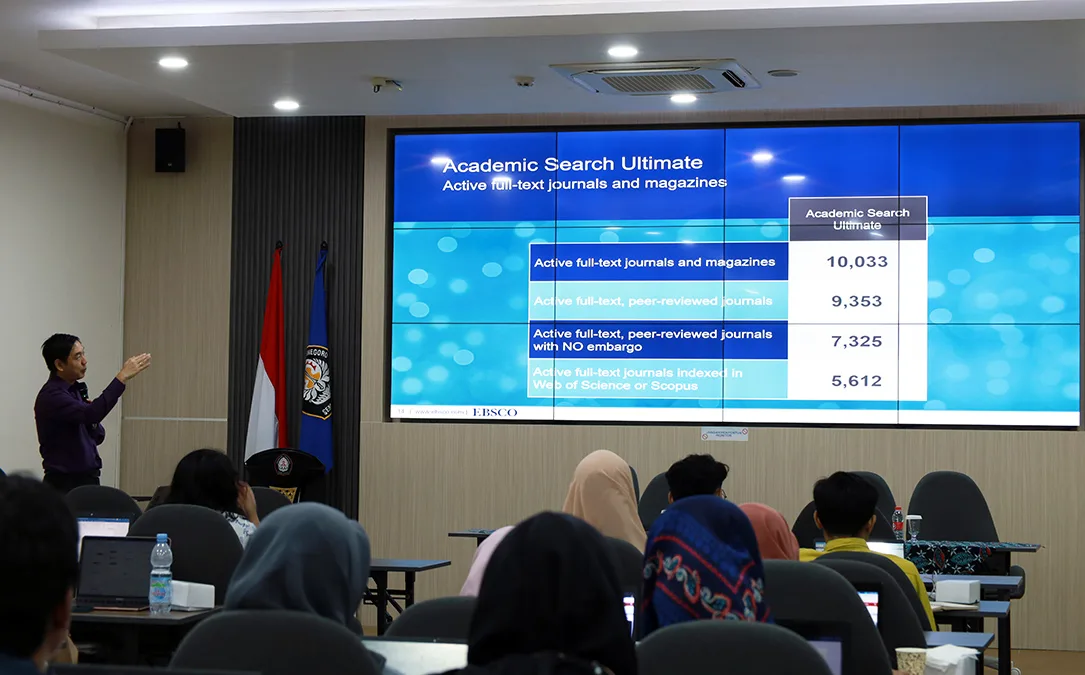UNDIP, Semarang (June 24, 2025) – The Technical Implementation Unit (UPT) of the UNDIP Library and Press organized a training session on utilizing EBSCO (Elton B. Stephens Company) e-journals, specifically for the academic community. The training was held on Tuesday, June 24, at the 4th Floor Meeting Room of the UNDIP Library and Press Building. Session 1 ran from 8 a.m. to 11:30 a.m., followed by Session 2 from 12:30 p.m. to 3 p.m. The event featured Erik Junikon as the keynote speaker, who explained the tools available within the EBSCO platform.
UNDIP’s Vice-Rector for Human Resources, Information Technology, Law, and Organization, Prof. Dr. Adian Fatchur Rochim, S.T., M.T., officially opened the event. He emphasized that the training aimed to facilitate academic writing. “This training is meant to support scientific publication by introducing EBSCO tools to ease the writing process. Moreover, journals published within UNDIP are now indexed by EBSCO, which increases their global visibility and contributes to Scopus-indexed publications. It’s time for UNDIP to awaken from its long slumber—we were in the top five in the Asia-Pacific in 2012,” he said.
Suwondo, S.Hum., M.Kom., Head of UNDIP Library and Press, expressed his hope that the program would enhance academic publication efforts. He also outlined the digital tools currently subscribed to by the UNDIP Library and Press.
“We hope this initiative will support publication efforts. UNDIP Library and Press are tasked with repository and literacy key performance indicators. To support publications, we subscribe to various AI and other tools, including Jenni AI, Paperpal, Gamma, Karyatulis.ai, DeepL, Quilbot Premium, SPSS Statistics 30, and ChatGPT,” he explained.
Erik Junikon from EBSCO International presented materials on the platform and the tools it offers.
“EBSCO provides academic databases, search capabilities, and access to more than 10,000 publications. It includes features like autosuggestions to help identify the most frequently searched keywords,” he said.
He also elaborated on advanced search tools such as:
- NOT to exclude specific terms from results,
- AND to find articles containing both specified keywords,
- Quotation marks (“”) for phrase searching,
- Asterisks (*) to retrieve word variants in English.
Almas Ghulam Riza, a student from the Public Administration program at the Faculty of Social and Political Sciences (FISIP) UNDIP, shared new insights he gained from the training.
“This training gave me a deeper understanding of topics I previously knew little about, such as journals and scientific articles. It’s extremely valuable for completing assignments and preparing scientific publications, including my thesis and proposals. EBSCO offers many tools to find specific and detailed articles that are still easy to use for students,” he said.
This training is part of Universitas Diponegoro’s strategic initiative to support its World Class University (WCU) goal by strengthening the capacity for scientific publication among its academic community. This digital literacy support is likely to boost publication productivity in reputable, Scopus-indexed journals and accelerate UNDIP’s progress toward ranking among the world’s top 500 universities. (Public Communication/ UNDIP/ Diyah Susila Wati)










